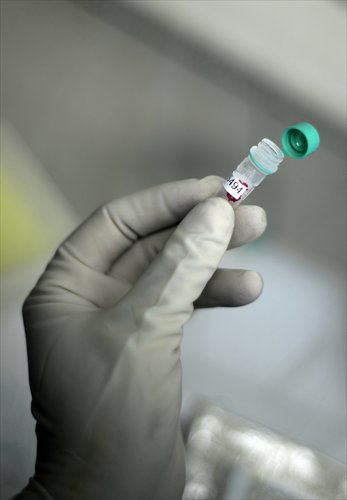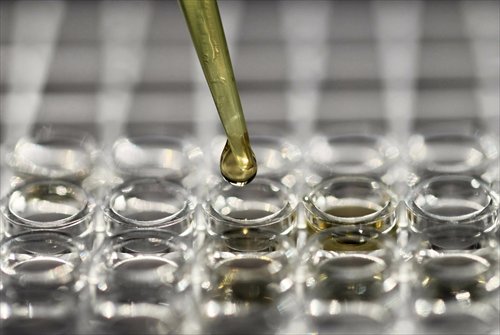HOME >> CHINA, METRO SHANGHAI
Making sex safe
By Ni Dandan Source:Global Times Published: 2014-12-29 18:38:01
New approaches help persuade gay men to undergo HIV tests

Each blood sample has a serial number but reveals no personal information. Photo: CFP
At the end of a corridor inside the disease control center in Jing'an district, two young men were waiting for their medical examination reports. They didn't seem nervous but chatted with the doctor.
This wasn't the first time they had been here, to this HIV VCT (voluntary counseling and testing) office. It took just a few minutes before each was handed a report. They exchanged smiles, buttoned up their overcoats and said goodbye to the doctor.
Doctor Jia, a middle-aged Shanghai woman, has been working at this office for years. She told the Global Times that around 80 percent of those who come to the office for a test were gay. "Some of them are quite familiar faces now. They come here every six months," she said. "On Tuesdays when we are open for the whole day we usually see more than 20 people and on Thursdays when we are open only for half a day we see 10 or so."
Across the city, each district and county offers these free HIV tests and counseling at local disease control centers. While early detection is vital in controlling the spread of the disease the big challenge is persuading potential carriers to undergo testing.
Between January 1 and November 20 this year, the city's health authorities reported 1,782 new cases of HIV. Official statistics report that of these cases 94.7 percent of the patients contracted the disease through sex and 63.9 percent of the cases were contracted after sexual activity between male homosexuals.
Gay community targeted
Shanghai's health authorities have targeted the gay community in their efforts to contain the spread of HIV. Since the beginning of 2014 authorities said they had encouraged some 8,000 people from the gay community to undertake tests.
There are no official statistics on the number of gay people in China but 8,000 must be far from the number of gay people in the city. International studies suggest gay people can account for 3 to 4 percent of the population so there could be at least 700,000 gay people in Shanghai.
Few gays in the city have come out - most are still struggling with their sexuality, let alone being brave and open enough to handle HIV tests and counseling. Both official channels and nongovernmental organizations have been working to show the importance of counseling and tests and trying to introduce friendlier approaches for the gay community.
For Dong Renjie (pseudonym) the time he was sitting in a room in the disease control center in Yangpu district recently seemed as if every second took a year to pass. He came there all the way from his home in Minhang district just to avoid the possibility of bumping into someone he knew.
If it weren't for the fact that one of his friends had been confirmed HIV positive, he wouldn't have been found near the center. Two months ago Dong ended a three-year relationship with his boyfriend and in the past few weeks he had been dating strangers he had met in gay bars. Sometimes in these encounters he did not use condoms.
"I heard about AIDS from time to time but none of my close friends had ever been infected until recently. Then I began thinking about what I had been doing over the past weeks and I got really scared," the 25-year-old told the Global Times.
This was the first time Dong had been to a disease control center for an HIV test. Contrary to his expectations, he wasn't asked to show his ID card, the doctor didn't look at him strangely or ask about his private life. "She only asked how I thought I might have contracted the virus."
Dong was told that to be safe he had better take another test in two months. The doctor told him that the virus was usually diagnosable from two weeks to three months after sexual activity. This was not great news for Dong. "I will be stressed out for the next few weeks. But having been here now I see how things work and it shouldn't be that much of a concern in the future."

A medical technician runs a test for HIV. Photo: CFP
Changing perceptions
He's not the only one who had the wrong idea about these centers. "We are doing everything we can to change perceptions. No matter whether the person here is gay or straight, male or female, their privacy is all important," said Li Wenjun, an official with the disease control center in Jing'an. "I think the overall environment is improving with the efforts being made by all the different parties," she told the Global Times.
In Jing'an, there is a nongovernmental organization that has been working with gay men and women to promote health awareness. The Shanghai Jing'an District Youth Service Center for AIDS Prevention has been operating with staff and volunteers from or known in the gay community and the founder Bu Jiaqing believes his group has helped gay people, who would not otherwise have done so, to undertake testing. This year, this service has encouraged more than 4,000 people to take a simple saliva test.
Some gay people have been working to inspire others to regularly take HIV tests - like the young men who recently gave a public lecture at a city university on AIDS and students' sexual behavior.
Raymond is a medical student who has been pushing peer education like this - where members of the community promote healthy changes in their lifestyles to others in the same groups. "I don't believe the high school system in China is properly educating young people in healthy sexual behavior, so peer education is vital. We'd like to teach more people how to protect themselves properly," he said.
He is gay himself and many of his gay friends have supported his initiatives by attending lectures and discussions. But Raymond said peer education was for all, not exclusively for the gay community.
"We shouldn't treat the gay community differently and we shouldn't treat AIDS differently. In our lectures, we tell people about sexually transmitted diseases which include AIDS as well as hepatitis B. We encourage everyone, not just gays, to take regular tests for HIV and hepatitis B."
Not 100 percent safe
Raymond told the Global Times that in their education programs, they emphasized that a condom had to be used for every sexual encounter, whether it was between a man and a woman or between two men. And even if condoms were used, an annual test for sexually transmitted diseases was still needed. "Condoms are not 100 percent safe and sometimes there is slippage or breakage."
Despite the good intentions Raymond said peer education was struggling to be accepted because of the long-standing social stigmas over HIV AIDS. "It's comparatively easy to make people more aware of the necessity of using condoms when having sex but it's hard to persuade them to undertake an HIV test."
In Shanghai, the percentage of men infected by HIV AIDS has been rising. In 2011, 891 out of every 1,000 HIV positive carriers were male. In 2014, the figure rose to 916. Sexual activity between gays is considered the most common way the disease is spread.
But Raymond said many gay people, even though they realized the risks, were reluctant to change their behavior. "Society's discrimination against AIDS is one thing but society's acceptance of homosexuality is another."
Believing that the lack of public acceptance makes many gay people uncomfortable to undergo HIV testing at official health institutions, "Blued," a smartphone app developed exclusively for gay social networking, has been offering its users HIV tests. The company gets the actual tests from disease control centers.
According to "Blued" about 3,000 gays undertook HIV tests at its facilities in 2013. The company has four test facilities in Beijing but has not yet established this service in Shanghai.
While many remain afraid that taking an HIV test will reveal their sexual orientation publicly, some have quietly included the test into their routine annual physical checkups. Vincent believes that this is a responsible approach.
When his mother first learned he was gay, she searched the Internet and found many disturbing links with being gay, especially syphilis and AIDS. "I accepted him being gay but I asked him to promise me some things - the most important was that he would stay healthy and never contract a disease," Vincent's mother, surnamed Piao, told the Global Times.
Working in the medical industry himself, Vincent said his attitude was that any sex had to be safe sex and he now includes HIV tests in his annual medical checkups.
"If you want to include HIV, hepatitis B and syphilis indicators in your blood test, you have to tell staff at a hospital health examination center to add these extra tests. Personally, I found this very normal and not at all weird."
Vincent said many gay people were embarrassed at having to go to a hospital for these tests but he personally believed the better facilities at hospitals provided more reliable test results.
No trouble
"Some NGOs offer saliva tests but the test results could be flawed because the test papers might have been stored wrongly and deteriorated. Some of these small facilities sometimes give you a false negative result, which can really scare you. I insist on having these tests done in a big hospital. Just include these tests in a routine physical checkup and it's no trouble at all."
Wang Hengli (pseudonym) also finds it convenient having his HIV tests included in his routine physical checkup. Although he gets on well with his partner of several years, he admits occasionally seeking fun beyond this relationship, which can be a health hazard.
"Wearing a condom is a must whether it's having sex with my boyfriend or another partner. But I've had times when condoms broke. These tests are important to assure me and my boyfriend that we are both healthy," he said.
Another young man, surnamed Li, told the Global Times that he visits disease control centers for HIV tests and counseling depending on the frequency of his sex life. "Normally, I visit an HIV VCT center every six months but if I haven't had any sex, like I haven't over the past seven months, I don't go - I don't think it's necessary."
Posted in: Society, Metro Shanghai, City Panorama